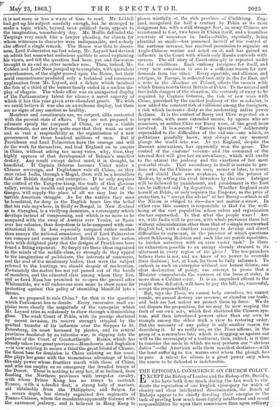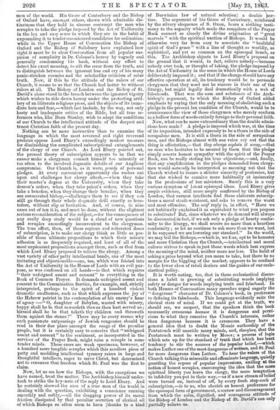THE EPISCOPAL CONSCIENCE ON CHURCH POLICY. XCEPT the Bishop of
London and the Bishop of St. David's, who have both done much during the last week to vin- dicate the reputation of our English episcopacy for width of charity and clear intellectual discrimination, the Bench of Bishops appear to be chiefly devoting their energies to the task of proving how much more lightly intellectual and moral responsibilities lie upon their consciences than upon ordinary men of the world. His Grace of Canterbury and the Bishop of Oxford have, amongst others, shown with admirable dis- tinctness that they hold in sincere contempt the man who scruples to take the pledge imposed by the Act of Uniformity in the lax and easy sense in which they are in the habit of expounding it to tender-conscienced candidates for ordination; while in the Upper House of Convocation the Bishop of Oxford and the Bishop of Salisbury have explained how right it must be to clear Convocation from all popular sus- pition of complicity in Dr. Colenso's heresy by vaguely and generally condemning his book, without any effort to detect his exact meaning, to sift the error from the truth, and to distinguish between the ignorant hue and cry of his many panic-stricken enemies and the scholarlike criticism of sobsr truth. Now, if this be the attitude of the rulers of our Church, it seems to us that the Church had better be without rulers at all. The Bishop of London and the Bishop of St. David's alone stand in the breach between the ignorant bigotry which wishes to ride down heresy under the protecting artil- lery of an illiterate religious press, and the objects of its imme- diate hate and fear,—which last include by the way, not only hasty and inadequate critics of the Bible, but all true re- formers who, like Dean Stanley, wish to adapt the conditions of our Church to the intellectual attitude of the deepest and truest Christian faith of the present day.
Nothing can be more instructive than to examine the language in which the most reverend and right reverend prelates oppose Lord Ebury's exceedingly modest measure for diminishing the complicated subscriptional entanglements of the clergy of our Church. As Lord Ebury pointed out, the present theory of subscription appears to be that we cannot make a clergyman commit himself too minutely or too often to the involved dogmatic details of our Anglican compromise. Our Church is, as it were, greedy of personal pledges. At every convenient opportunity she rushes out upon and challenges her clergy afresh,—when they take their master's degree at the University, when they take deacon's orders, when they take priest's orders, when they take a benefice, when they change their benefice, when they are consecrated bishop,—challenges them to see if they can still go through their whole dogmatic drill exactly as here- tofore, without slip or hesitation. And, of course, in nine cases out of ten it is, and must be done, without the slightest serious reconsideration of the subject,—for the consequence of any really deep study would be a cloud of new questions and scruples exceedingly inconvenient to the clergyman. The true effect, then, of these copious and reiterated doses of subscription, is to make our clergy think as little as pos- sible of those ultimate propositions to which their minute adhesion is so frequently required, and least of all of the most unpleasant propositions amongst them, such as that from which Lord Ebury proposed to relieve the clergy. Among a vast variety of other petty intellectual bonds, one of the most irritating and objectionable—one, too, which was foisted into the Act of Uniformity in the House of Lords with an evil pur- pose, as was confessed on all hands—is that which requires "their unfeigned assent and consent" to everything in the Book of Common Prayer. It demands unfeigned assent and consent to the Commination Service, for example, and, strictly interpreted, perhaps to the spirit of a hundred violent dramatic anathemas, such as that which expresses the joy of the Hebrew patriot in the contemplation of his enemy's hour of agony :—" 0, daughter of Babylon, wasted with misery, happy shall he be that rewardeth thee as thou hast served us ; blessed shall he be that taketh thy children and throweth them against the stones !" There may be every reason why such passionate outpourings of Jewish vengeance should be read in their due place amongst the songs of the peculiar people, but it is certainly easy to conceive that "unfeigned assent and consent" to the sentiment, as incorporated in the services of the Prayer Book, might raise a scruple in some tender minds. These cases are weak specimens, however, of a hundred more tangible scruples which this needless piece of petty and meddling intellectual tyranny raises in large and thoughtful intellects, eager to serve Christ, but determined not to renounce that freedom which St. Paul was the first to claim.
Now, let us see how the Bishops with the exceptions we have named, treat the matter. The Archbishop himself under- took to strike the key-note of the reply to Lord Ebury. And he certainly showed the ease of a true man of the world in dealing with the question, exhibiting a conscience running smoothly and softly,—all the dragging power of its moral friction dissipated by that peculiar secretion of clerical oil of which Bishops so often seem to have (thanks to a kind I partially relieve us.
of Darwinian law of natural selection) a double or- don. The argument of his Grace of Canterbury, reinforced by the silvery eloquence of S. Oxon, bears a striklibes testi- mony to the sagacity which made the compilers of the Prayer Book connect so closely the divine origination of "great marvels" with the spiritual unction of Bishops. It would be otherwise very far from easy to associate the "healthful spirit of God's grace" with a line of thought so worldly, so sophistical, and yet so common on the episcopal bench, as this. The Archbishop objects to Lord Ebury's proposal on the ground that it would, in fact, relieve nobody—because nobody ever took, or thought of taking, the pledge imposed by the Act of Uniformity in the sense in which the House of Lords deliberately imposed it ; and that if the change should have any effective operation at all, its tendency would be to persuade clergymen that they need not be sincere in their use of the liturgy, but might legally deal dramatically with a web of falsehoods. That was the sum and substance of the Arch- bishop's argument, to which the Bishop of Oxford added emphasis by saying that the only meaning of abolishing such a pledge in the present lax condition of the Church, would be to countenance the view of those clergymen who merely conform to a hollow form of words entirely foreign to their personal faith.
Now, what can be more extraordinary than the double admis- sions here made ? A pledge is imposed which was, at the time of its imposition, intended expressly to be a thorn in the side of scrupulous men. It is still a thorn in the side of scrupulous men, and the Bishops almost with one voice crY out that the thing is affectation,— that they always explain it away,—that no man who hesitates to be assured by them that the pledge simply asserts honest sympathy with the spirit of the Prayer Book, can be really stating his true objections —and, finally, that any simplification in the pledges demanded from clergy- men would naturally be interpreted as meaning not that the Church wished to insure a stricter sincerity of profession, but that she wished to connive more habitually at insincerity in the professions of her ministers. Surely this is a very curious symptom of latent episcopal ideas. Lord Ebury gives ample evidence, still more amply confirmed by the Bishop of London, that earnest intellects find these elaborate subscrip- tions a moral strait-waistcoat, and asks to remove the worst and most offensive. The nay' reply is, in effect, "Rave we not habitually explained it as equivalent to what you propose to substitute? But, since whatever we do demand will always be discounted in fact, if we ask only a pledge of hearty confor- mity to the liturgy, we shall secure no more than a heartless conformity ; so let us continue to ask more than we want, lest it be supposed we are lowering our standard." In the world, we may tell the Bishops,—which is we fear, apt to be honester and more Christian than the Church,-intellectual and moral culture strives to speak in just those words which best express the meaning of the mind, neither more nor less. The habit of asking a price beyond what you mean to take, lest there be no margin for the higglin,g of the market, appears to be confined to the lower class of retail dealers and the guides of our cock- siastical It is worth noting, too, that in these ecclesiastical discus- sions a habit is growing of substituting words implying safety or danger for words implying truth and falsehood. In both Houses of Convocation many speeches urged eagerly the " dangerous " character of Dr. Colenso's book, in preference to defining its falsehoods. This language evidently suits the clerical state of mind. If we could get at the truth, we should see, we suspect, that the speakers think the book necessarily erroneous because it is dangerous and perni- cious to what they conceive the Church's interests, rather than dangerous because it is erroneous. They have a general idea that to doubt the Mosaic authorship of the Pentateuch will unsettle many minds, and, therefore, that the Pentateuch must be written by Moses ; a process of login which sets up for the standard of truth that which has least tendency to stir the sources of the popular belief,—which makes Luther one of the most dangerous of writers, and St. Paul far more dangerous than Luther. To hear the rulers of the Church talking this miserable and effeminate language, quietly guarding the repose of popular impressions, smiling at the notion of honest scruples, encouraging the idea that the more spiritual liberty you leave the clergy, the more temptation to infidelity you put in their way,—as if a new stream of belief were turned on, instead of off, by every fresh stop-cock of subscription,—is to us, who cherish an honest preference for the episcopal form of government, a sorrow and discouragement from which the calm, dignified, and courageous attitude of the Bishop of London and the Bishop of St. David's can only































 Previous page
Previous page